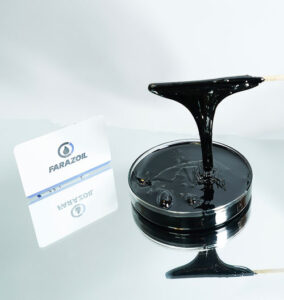Bitumen plays a crucial role in the construction industry, particularly in waterproofing applications. It is widely used for its excellent waterproofing properties and durability. Here are some key points regarding the use of bitumen for waterproofing in the construction industry:
- Roofing: Bitumen is commonly used for waterproofing flat and low-sloped roofs. It provides a protective barrier against water penetration, preventing leaks and water damage to the building structure.
- Foundation Waterproofing: Bitumen coatings and membranes are applied to the foundation walls to prevent water infiltration and protect the structure from moisture-related issues, such as dampness and foundation cracks.
- Basement Waterproofing: Bitumen-based coatings and sealants are utilized to waterproof basement walls and floors. This prevents water seepage and moisture buildup, ensuring a dry and habitable basement environment.
- Bridge Decks and Tunnels: Bitumen waterproofing systems are employed in the construction of bridge decks and tunnels to enhance their durability and protect against water ingress, which can cause structural deterioration.
- Road Construction: Bitumen is used in the construction of roads and highways as a waterproofing agent. It helps in preventing water penetration into the pavement layers, thereby increasing the lifespan of the road infrastructure.
- Damp Proofing: Bitumen coatings are applied to building walls, especially below-grade walls, to provide damp proofing. This prevents moisture from seeping through the walls, protecting the interior spaces from dampness and mold growth.
- Tank and Reservoir Waterproofing: Bitumen-based membranes are utilized to waterproof tanks, reservoirs, and other storage structures to prevent leakage and preserve the integrity of stored liquids or materials.
- Green Roof Waterproofing: Bitumen membranes are used in the waterproofing systems of green roofs, providing an effective barrier against water penetration and protecting the underlying structure.
Bitumen’s versatility, cost-effectiveness, and excellent waterproofing characteristics make it a preferred choice for various applications in the construction industry. Proper application and adherence to industry standards are essential for ensuring the effectiveness and longevity of bitumen waterproofing systems.
The importance of bitumen in the construction industry
Bitumen holds significant importance in the construction industry due to its versatile properties and wide range of applications. Here are some key reasons highlighting the importance of bitumen in construction:
- Waterproofing: Bitumen is highly valued for its excellent waterproofing capabilities. It forms a durable and impermeable barrier, protecting buildings and structures from water infiltration, which can cause damage, deterioration, and structural instability.
- Durability: Bitumen’s inherent durability makes it an ideal choice for construction projects. It can withstand extreme weather conditions, temperature variations, and heavy loads, providing long-lasting protection to the built environment.
- Road Construction: Bitumen is extensively used in road construction for pavement layers. It acts as a binding agent, providing strength, flexibility, and resistance to deformation. Bitumen also enhances the skid resistance of roads, ensuring safer driving conditions.
- Asphalt Production: Bitumen is a key component in the production of asphalt, which is widely used for road surfacing. Asphalt mixes containing bitumen offer excellent durability, resistance to cracking, and smooth driving surfaces.
- Adhesive Properties: Bitumen’s adhesive properties make it an essential component in various construction applications. It is used as an adhesive for roofing materials, insulation boards, and membranes, providing secure bonding and preventing water penetration.
- Insulation: Bitumen is utilized for insulation purposes in the construction industry. It serves as an effective thermal insulator, minimizing heat transfer and reducing energy consumption in buildings.
- Versatility: Bitumen can be modified and blended with other materials to enhance its properties. This versatility allows for customization based on specific project requirements, ensuring optimal performance and durability.
- Cost-effectiveness: Bitumen is a cost-effective material, offering a favorable balance between performance and cost. It provides long-term protection, minimizing the need for frequent repairs or replacements, thereby reducing overall construction and maintenance expenses.
- Recycling: Bitumen can be reclaimed and recycled from old pavements and construction materials. This recycling process helps in reducing waste, conserving natural resources, and promoting sustainable construction practices.
Overall, bitumen plays a vital role in the construction industry by providing essential waterproofing, durability, insulation, and adhesive properties. Its versatility, cost-effectiveness, and recyclability make it a preferred choice for a wide range of construction applications, contributing to the longevity and sustainability of built structures.
The application of bitumen in building insulation
Bitumen finds application in building insulation due to its excellent properties. Here are some key applications of bitumen in building insulation:
Waterproofing floors and walls
Waterproofing floors and walls is a crucial aspect of building construction to protect against water damage. Bitumen-based waterproofing systems are commonly used due to their excellent water resistance and durability. The process begins with surface preparation, ensuring that the floor or wall is clean, dry, and free from any contaminants. A bitumen-based primer is then applied to promote adhesion and create a strong bond between the surface and the waterproofing membrane.
Next, bitumen waterproofing membranes, such as sheets or rolls, are installed on the prepared surface. These membranes are carefully overlapped and adhered using heat or adhesive, forming a continuous and watertight barrier. Special attention is given to sealing joints, corners, and penetrations with bitumen sealants or tapes to prevent any water seepage in vulnerable areas.
Waterproofing roofs and terraces
Waterproofing roofs and terraces is essential to protect buildings from water leakage. Bitumen-based waterproofing solutions are widely utilized for their effectiveness in these areas. The process starts with surface preparation, ensuring that the roof or terrace is clean and free from any debris. Any existing waterproofing layers may need to be removed before applying new waterproofing materials.
Bitumen membranes, such as modified bitumen sheets or rolls, are then installed on the roof or terrace surface. These membranes are carefully laid and adhered, ensuring proper overlap and sealing of joints. Additionally, vulnerable areas such as roof edges, corners, and penetrations are given special attention to ensure a watertight seal. Coatings or sealants may also be applied to provide an extra layer of protection against water infiltration.
Waterproofing bathrooms and toilets
Waterproofing bathrooms and toilets is crucial to prevent water damage and maintain hygiene. In these areas, a combination of waterproofing techniques is used. The process begins with surface preparation, including cleaning, repairing any cracks or gaps, and ensuring a smooth substrate.
A bitumen-based primer is then applied to improve the bonding of the waterproofing membrane. Bitumen membranes or liquid-applied coatings are used to create a protective barrier on the floors, walls, and even shower areas. These membranes are installed with proper overlap and attention to detail, ensuring a watertight seal. Special care is given to sealing joints, corners, and areas around plumbing fixtures to prevent water leakage.
Insulating building pipelines
Insulating building pipelines is essential to reduce heat loss or gain during fluid transportation. Bitumen-based insulation materials are commonly used for their thermal properties and durability. The process starts with surface preparation, ensuring that the pipeline is clean and free from any contaminants.
Bitumen insulation materials, such as pre-formed sheets or sprayed coatings, are applied to the pipelines. These materials create a thermal barrier, reducing heat transfer. Proper sealing of joints and connections is important to maintain the integrity of the insulation system and prevent any moisture ingress.
Insulating building facades
Insulating building facades involves the use of various insulation materials, and while bitumen is not typically the primary insulation material, it can play a role in certain applications. Bitumen-based coatings or sealants may be used in rendering or cladding systems to provide water resistance and enhance the durability of the insulation system. Additionally, bitumen-based materials can be used for sealing joints and gaps to prevent air infiltration and improve the thermal performance of the building envelope. Proper surface preparation and application techniques are crucial to ensure the effectiveness of the insulation system and maintain energy efficiency in the building.
Important points before waterproofing buildings with bitumen
Before waterproofing buildings with bitumen, it is important to consider the following points:
- Surface Preparation: Proper surface preparation is crucial for effective waterproofing with bitumen. The surface should be clean, dry, and free from any contaminants such as dust, dirt, oil, or loose particles. It may require cleaning, repairing any cracks or damages, and ensuring a smooth substrate before applying bitumen-based products.
- Compatibility: Ensure that the substrate and the bitumen waterproofing materials are compatible. Different substrates may require specific primers or preparation methods to ensure proper adhesion and compatibility with the bitumen products. Consult the manufacturer’s guidelines or seek professional advice to determine the appropriate compatibility measures.
- Weather Conditions: Consider the weather conditions during the application of bitumen waterproofing. Bitumen products are typically applied in a liquid or semi-liquid form and require specific temperature and humidity conditions for proper curing and adhesion. Avoid applying bitumen-based products during rainy or excessively hot conditions, as it can affect the performance and durability of the waterproofing.
- Proper Application Techniques: Follow the recommended application techniques for bitumen waterproofing. This may include using the appropriate tools, such as brushes or rollers, to ensure even and consistent coverage. Pay attention to recommended thickness and overlapping requirements for bitumen membranes or coatings to achieve optimal waterproofing results.
- Joint and Detailing: Properly seal joints, corners, and penetrations to ensure complete this. Use bitumen sealants or tapes specifically designed for these areas to prevent water seepage. Pay attention to vulnerable areas such as drains, pipes, or protrusions, and ensure they are properly integrated into the waterproofing system.
- Maintenance: Regular maintenance is important to ensure the longevity of the bitumen waterproofing system. Inspect the waterproofed areas periodically for any signs of damage or deterioration. Promptly address any issues such as cracks, blisters, or areas of water penetration to prevent further damage.
Remember, it is advisable to consult with professionals or follow manufacturer guidelines for specific recommendations and best practices when it comes to waterproofing buildings with bitumen.
Conclusion

